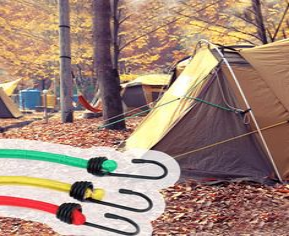To begin with, when it’s about famous outdoor activities, having a tent rope can make a real impact in ensuring that your camping trip will be secure and enjoyable. Tent ropes or the guy lines similarly help you with anchoring and stabilizing your tent in prevailing winds, particularly windy or harsh environments. With a full cart of choices, selecting the best tent rope can be challenging. Let’s look at points that will provide you with ease in choosing good quality tent ropes.

Tent Rope Materials
The material used in tent ropes significantly impacts their strength, durability, and performance. Common materials include nylon, polyester, and Dyneema, each offering unique benefits:
Nylon Ropes
Nylon ropes are known for their high strength and elasticity. Their ability to stretch helps absorb shock loads, which prevents the tent from being uprooted during strong winds. Additionally, nylon ropes have good abrasion resistance, making them durable in rough conditions. However, prolonged exposure to sunlight can degrade nylon ropes, affecting their elasticity and overall strength over time.
Polyester Ropes
Polyester ropes are highly resistant to UV radiation, moisture, and mildew, making them ideal for outdoor use. They stretch very little, keeping the tent setup firm and stable. Despite being lightweight, polyester ropes are strong and less likely to break, making them perfect for backpacking and long-distance hiking.
Dyneema Ropes
Made from high-molecular-weight polyethylene (HMPE), Dyneema ropes are incredibly strong and durable. These ropes resist chemicals and UV radiation, making them suitable for harsh environments. Although Dyneema ropes are more expensive compared to nylon and polyester ropes, their durability justifies the cost for demanding applications.
Rope Diameter
The diameter of a tent rope is crucial for its performance. Thicker ropes generally offer more strength and durability but can add extra weight. For most camping and backpacking needs, a rope diameter of 3mm-5mm strikes a good balance between strength, weight, and manageability.
Reflective Properties
Some tent ropes come with reflective properties, enhancing visibility and safety at night. Reflective ropes help prevent tripping hazards and make it easier to locate your tent in low light conditions.
Length and Adjustability
When selecting tent ropes, consider the recommended length for your specific tent and the type of terrain you’ll be camping on. Having a few extra feet of rope can be beneficial for adjustments. Adjustable tension systems, such as line tighteners or taut-line hitches, allow you to easily achieve the right tension, ensuring your tent stays securely in place.
Conclusion
Choosing the right tent rope involves considering factors like material, diameter, reflective properties, and length. A dependable, safe, and convenient tent rope enhances your camping experience, providing peace of mind and stability. Equip yourself with the ideal tent rope, such as those from THISPOWER, and enjoy a confident, worry-free camping adventure.

thispower
Let's start working together now!
Years of professional OEM experience to meet customised needs. Fill in the enquiry form to cooperate with us and enjoy high quality service.

